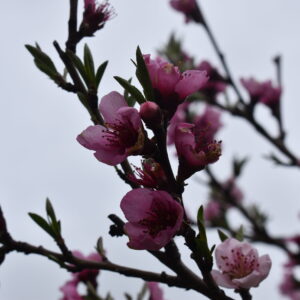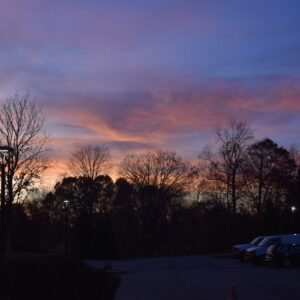Blessed Francis was overjoyed at the place granted to the brothers, especially because of the name of this church of the Mother of Christ, and because it was such a poor little church, and because of the surname it had, for it was surnamed: “of the Portiuncula.” This name foreshadowed that it was to be the mother and head of the poor Lesser Brothers. It was called “Portiuncula” after the neighborhood where that church was built, which from earliest times was called “Portiuncula.” Blessed Francis used to say: “This is why the Lord willed that no other church be granted to the brothers, and why the first brothers would not build any completely new church, and would not have any other but this one. For this church was a prophecy that has been fulfilled in the coming of the Lesser Brothers.” And although it was poor and almost in ruins already for a long time, the people of the city of Assisi and its neighborhood had always held the church in great devotion and hold it in even greater devotion today (St. Francis of Assisi, “The Assisi Compilation,” FA:ED, Vol. 2, pp. 154).
Franciscan Foundations

The Portiuncula chapel is preserved inside the Basilica of St. Mary of the Angels in Assisi.
Though Saint Francis is well known for his extensive travels to preach the gospel of peace and repentance, he also had a great attachment to particular places, especially those with special significance for his spirituality and the development of his order. One place that became very special was the small church outside the city of Assisi called St. Mary of the Angels, or as it was called by the local people, St. Mary of the Portiuncula. After he and his brothers were driven away from their makeshift home at Rivo Torto early on in their evangelical common life, they found another place to live at the dilapidated church of the Portiuncula in the valley below Assisi. Portiuncula in Italian means “little portion,” and the church holds that name to this day. St. Francis told his brothers: “See, my sons, that you never desert this place. If you are driven out by one way, come back by another, for this place is truly holy, and the abode of God” (Thomas of Celano, Part I, Ch. 7, §106).
Little Portion, a Spiritual Center
Thus was born the Franciscan emphasis on “little portion.” Francis was not simply giving his brothers some practical advice about always having a roof over their heads. He knew that his movement needed a home, a center, in which to flourish. He said that God blessed this instinct by making the Portiuncula a meeting place between heaven and earth. The little portion of land was carefully tended by Francis and his brothers and still is today.
Franciscans have also understood this principle of little portion analogously. That is, not only do we need physical little portions, we also need spiritual ones – internal places that we will not relinquish, interior spaces that are necessary for the growth of our relationship with and service to God, neighbor, and the earth.
Laudato Si’ Connections
A sense of homelessness haunts people in our own time. Not only do many lack integration into a community, but they are not at home with themselves. They have not connected with that internal little portion in which is situated their unique and irreplaceable call in God, who has given them unique gifts to put at the service of others. In the words of the poet Robert Frost: “They cannot scare me with their empty spaces /Between stars – on stars where no human race is. / I have it in me so much nearer home / To scare myself with my own desert places.” The worst kind of loneliness is the fear of being alone with ourselves, unsure that there is anything worthwhile within us. One goal of these educational modules is to show how interaction with creation can give rise to awareness of one’s infinite worth and unique call in God.
Laudato Si’ teaches us that it is in the nature of human beings to flourish with and within our environment, never apart from it. The more engaged persons are with their local place, the stronger the connections will become, not only with the place but also with the human communities inhabiting the place, and the more the capacity to care will grow and be sustained into future generations. As Pope Francis says so well:
[L]ocal individuals and groups can make a real difference. They are able to instill a greater sense of responsibility, a strong sense of community, a readiness to protect others, a spirit of creativity and a deep love for the land. They are also concerned about what they will eventually leave to their children and grandchildren (LS §179).
Sense of Belonging
The cultivation of little portions in our exterior environment also fosters cultivation of our interior little portions. For each of us, our sense of self and of belonging to others, to a community, is deepened by interaction with particular places, which provide space for gathering with others and which facilitate moments of solitude and internal dialogue with God. In Laudato Si’, Pope Francis quotes Pope Emeritus Benedict XVI: “The external deserts in the world are growing, because the internal deserts have become so vast” (LS §217). Likewise, it follows that if the internal deserts become verdant, the external deserts will as well.
 Particular Accent of FSE Spirituality
Particular Accent of FSE Spirituality
Naming, a Way of Relating to Inner Nature
In working on the land with others, the Franciscan Sisters of the Eucharist have a particular attachment to the practice of “naming” in the Franciscan spirit of little portion. This practice, evident in many of the experiential learning activities, can help foster the care of little portions, both external and internal. Naming goes back to the dawn of creation, when God gave Adam the responsibility of naming all the other creatures (cf. Gen 2: 19-20). Naming is not simply applying an arbitrary word to identify a creature for the sake of convenience, but rather, it is a way of making known the inner nature of that creature. By extension, when humans “name” something, it means they are attentive to the inner nature of that particular aspect of creation and its interrelationship with other aspects of creation. Laudato Si’ explains: “This responsibility for God’s earth means that human beings, endowed with intelligence, must respect the laws of nature and the delicate equilibria existing between the creatures of this world. . .” (LS §68). Throughout these modules, the activities are based on this foundation of observing, wondering about, and respecting the nature and the laws inherent in each part of creation. Each “little portion” has its own revelation to give in relation to each other “little portion.”
For Saint Francis, the activity of naming little portions was one of love and affection, as Pope Francis emphasizes in Laudato Si’:
His response to the world around him was so much more than intellectual appreciation or economic calculus, for to him each and every creature was a sister united to him by bonds of affection. That is why he felt called to care for all that exists. His disciple Saint Bonaventure tells us that, “from a reflection on the primary source of all things, filled with even more abundant piety, he would call creatures, no matter how small, by the name of ‘brother’ or ‘sister’” (LS §11).

Special Case
The practice of naming and thus revealing little portions of creation occurs in consonance with the naming of little portions within each human being. In the work of revealing and caring for little portions of earth in the mystery of “little portion,” our own personal character is also revealed and developed. Each person is unique and has a unique way of approaching life, along with particular gifts to offer as well as particular weaknesses. In other words, each one is a “special case.” This reality calls us to name and honor the little portion of each person. For instance, one person may have the gift of attention to detail while another comprehends the whole picture. Someone else may integrate the two in a particularly astute way. Yet all these gifts are exercised with a particular “accent” according to the personal development and gifts of each. Through the process of naming in the mystery of little portion, we grow in our capacity to know one another, not superficially, but essentially. In that way we can interact in a fruitful way, meeting persons where they are and accompanying them on their life journeys, helping them to come to their fullest personal development. As we are attentive to the internal laws of each portion of creation, our sense of wonder at each creature and appreciation of the value of each human being are strengthened. There is thus a mutuality between natural and human ecology that can be incarnated in a particular way through the practice of naming and fostering interconnections with particular external and internal “little portions.” This mutuality is at the heart of the practice of integral ecology as called for by Pope Francis in Laudato Si’.
Ultimately, it is God who knows and loves each of us particularly and most intimately. We are each a little portion in His eyes:
How wonderful is the certainty that each human life is not adrift in the midst of hopeless chaos, in a world ruled by pure chance or endlessly recurring cycles! The Creator can say to each one of us: ‘Before I formed you in the womb, I knew you’” (Jer 1:5). We were conceived in the heart of God, and for this reason “each of us is the result of a thought of God. Each of us is willed, each of us is loved, each of us is necessary” (LS §65).
In these modules, each educational activity can be seen as a kind of “little portion” providing specific, concrete experiences of integral ecology in different natural settings. The goal is to help persons avoid a mindset of abstraction that may divert them from embarking on the path of ecological conversion by providing hands-on little portion experiences that both reconnect persons with their local land and encourage concrete processes of interior and exterior conversion.
Supplemental References
- Pope Francis Laudato Si’ (2015)
Ecology of Daily Life (§§147-155)
Importance of local places (§§143-146;179-180; 183) - St. Francis, “The Assisi Compilation,” in St. Francis of Assisi: Early Documents
- Franciscan Life Process Center
- Franciscan Sisters of the Eucharist
- Catholic Ecology Center & https://laudatosiproject.com/
- Laudato Si‘ Garden at Fahr Monastery, Switzerland
- Film: “The Biggest Little Farm” (2018).





